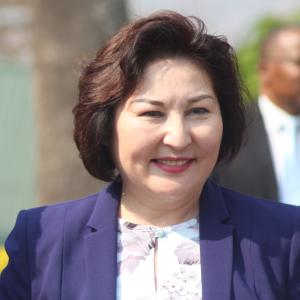I am indeed pleased to be here today, in this very important meeting that deals with one of the major challenges of illicit financial flows that are being faced not only by our region but by the entire world.
One has to look at the report by the former president of the Republic of South Africa, Thabo Mbeki where it is estimated that USD 50 Billion a year is lost by the continent in illicit financial flows, to see the scale of the problem. 40% of which is estimated to be the proceeds of crime. One can immediately see the devastating effect of illicit financial flows and money laundering on the continent.
It is exactly for these reasons that the discussion on the problem of illicit financial flows is being brought up to the UN General Assembly, which included it into the Agenda of its new session. It is for the same reasons that SADC member states highlighted the need to address corruption, transnational organised crime as key impediments to sustainable development in SADC Region. Relevant references have been made in Communique approved by Heads of States/Governments at the recent SADC Summit, which took place in August 2019 in Tanzania.
Strong commitment to address the scourge of corruption and money laundering was expressed at the meeting of the members of the Assets Recovery Inter-agency Network In Southern Africa (ARINSA) at the high-level meeting in June 2019 in Dar-Es-Salam, Tanzania. The Dar-Es-Salam Declaration, which is being signed today by the Government of Eswatini, calls for stronger cooperation at national, regional and global levels.
In today’s increasingly globally connected world, the crimes of corruption, money laundering and drug trafficking routinely cross national borders. Supported by the United Nations Office on Drugs and Crime (UNODC), ARINSA encourages collaboration through its network of contact points by putting prosecutors and investigators in touch with counterparts in member countries and with colleagues in another eight networks across the world.
It is a great honour and pleasure for me to join you in the first meeting of the Asset Recovery Committee of Eswatini. The Committee will go a long way to help to develop the fight against economic crime in Eswatini.
The mission of asset forfeiture is to ensure that we begin to take the profit out of crime. To roll back crime, the state has to ensure that it becomes true “that crime does not pay.” And the advantage of forfeiture is that the property seized from criminals can be used to fight crime. The assets recovered from illicit economy and crime can be also utilised for so much needed support to the development of the country, as well as to the victims of crime and disadvantaged ones.
I want to thank the Eswatini for the support which it has applied to the development of ARINSA as an original member of the network. The sixteen member countries of ARINSA cover a very significant part of Africa. It was noted at the ARINSA Annual General Meeting in June 2019 that the ARINSA Network had been responsible for seizing over USD 1 Billion in 2018. This is a significant development for the region and sends a clear message to criminals that they are at risk of losing their assets.
Indeed together we can do more to make Eswatini and the whole Southern Africa a very unattractive place for criminals to set up their infrastructure to commit crime and to enjoy the proceeds of such criminal activities. More than spending time behind bars, criminals must know that there is an added disincentive of losing their assets. This no doubt gives full expression to our commitment that we will relentlessly pursue those who organise crime and hope to benefit from it.
I thank you!





